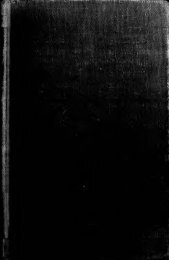Ecclesiastes - GA Barton - 1908.pdf
Ecclesiastes - GA Barton - 1908.pdf
Ecclesiastes - GA Barton - 1908.pdf
Create successful ePaper yourself
Turn your PDF publications into a flip-book with our unique Google optimized e-Paper software.
l6o ECCLESIASTES<br />
state of nothingness. 5. For the living know that they shall die].<br />
The clause presents a reason for the statement of the preceding<br />
verse, but the reason betrays a strange mood of pessimism. The<br />
dead know not anything. To have power to perceive that one<br />
must die is to be greater than the dead, who have no knowledge.<br />
their<br />
Qoheleth's eschatology is that of Ps. 88 10 and ii5 17 . For<br />
memory is forgotten].<br />
That a dead man would be forgotten seems<br />
to have been taken for granted by the Hebrews, cf. Ps. 9 6<br />
3i 12<br />
41 5 .<br />
This fact constitutes for Qoheleth one of the great tragedies of<br />
life, cf. i 11 2 16 . This verse is quoted and opposed in Wisd. 2 4 .<br />
6. Their love as well as their hate and their jealousy have already<br />
perished]. The strongest passions are hushed in the calm of death.<br />
No portion forever . . . under the sun]. The dead are denied<br />
participation in the only world of which Qoheleth knows,<br />
his mind makes the pathos of death a tragedy.<br />
this to<br />
9 2 . SDH]. See on vs. i. iirw], (&, S and U apparently read i^ao (cf.<br />
McN. 149). This is rightly followed by Zap. and McN., and has been<br />
adopted above. aitoS] is a supernumerary in the text. Gins, held that<br />
it was introduced before "nnaV and NEB 1<br />
? to show that these referred to<br />
moral, not ceremonial, qualities; it not only makes awkward Heb., but the<br />
moral qualities have been included in the preceding pair. &, H and A<br />
added jnS to make another balanced pair, but < omits JiaV altogether, and<br />
is rightly followed by Bick., Wild, and Sieg.<br />
(& has apparently preserved<br />
many pre-Aqiban readings in this passage, and this one has been adopted<br />
above. &n> ..... 21t3 ^], for rhetorical effect the structure of the last<br />
two pairs is varied. 3. Soa jn]. Kn., Hit., Gins., Ew. and Del. take this<br />
as a way of expressing the superlative, comparing Jos. I4 15<br />
Ju. 6 15 and<br />
Ct. i 8 . Wr. points out, however, that in these cases the adj. is accom-<br />
panied by the article, and that this is really parallel to Ob. 2 and La. i 1<br />
,<br />
where the adjs. do not have the art., and where it is doubtful whether<br />
the writers intended to express a superlative or not. ins mpn], cf.<br />
on 2 14 and 9 2 . xSn] may, as Del. and Wr. note, be either an adj. or a<br />
verb, but is probably a verb. Everywhere, except in Je. 6", it takes an<br />
ace. of material as here, cf. Dt. 6U 33 23<br />
34 s . mSSm], cf. on i 17 . Perhaps<br />
to be pointed rnSSin. innx],





